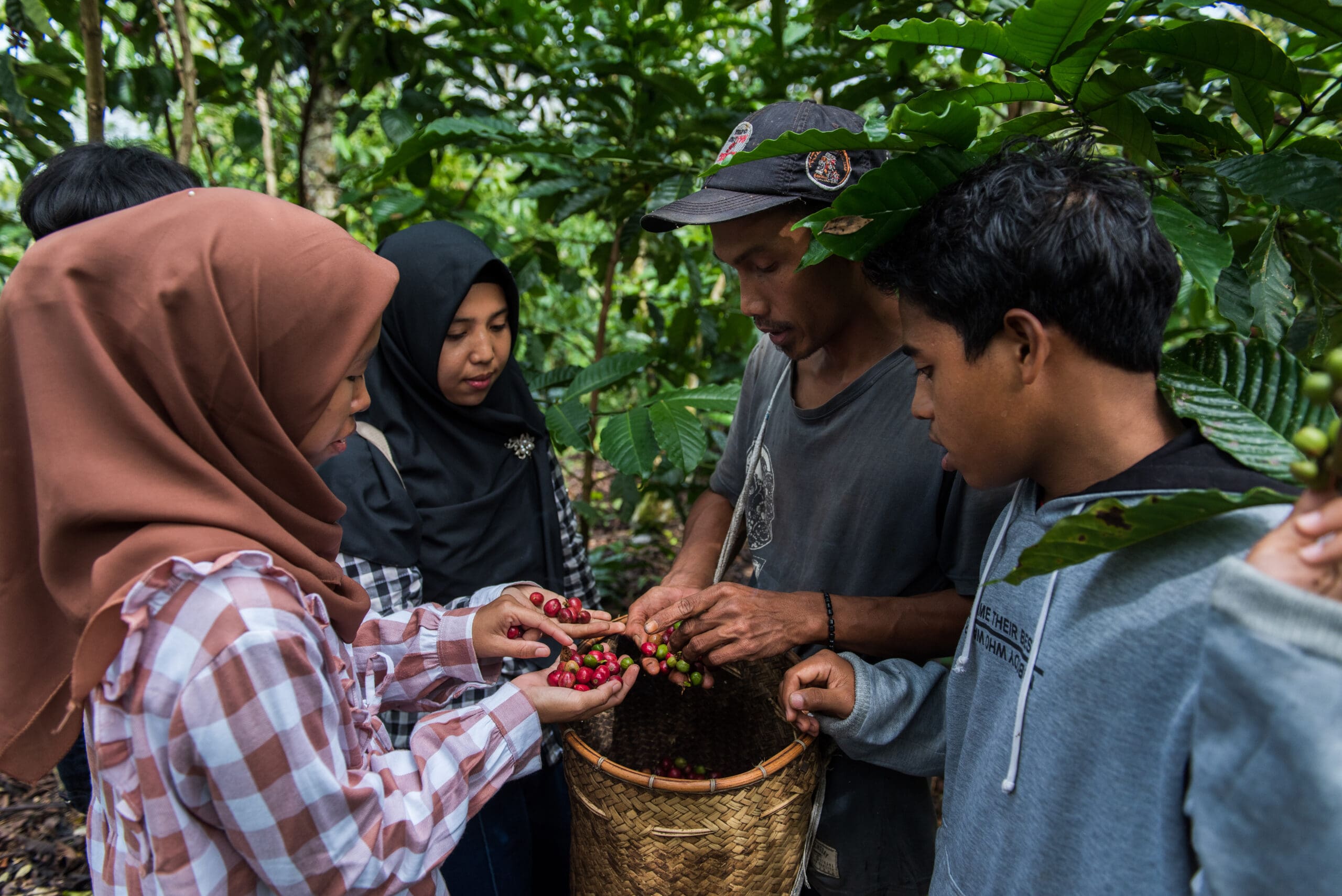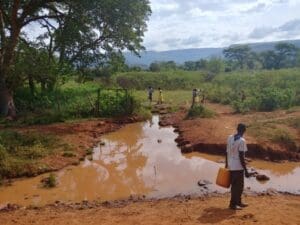WASHINGTON, DC (May 25, 2023)—A new resource seeks to support companies and investors in understanding the shared value community monitoring could add to their operations and investments, and outlines principles to help them build productive partnerships with communities to secure their land tenure and improve compliance with environmental and social standards and commitments.
The document, “Principles of Community Monitoring: A Path for Companies and Investors to Strengthen Human Rights and Environmental Due Diligence and Support Community Tenure in Land-based Sectors” (also available in Bahasa Indonesia) was produced by the Interlaken Group through a collective, multi-stakeholder process involving leaders from the private sector, civil society, and Indigenous and local community groups.
The Interlaken Group is an informal network of leaders from influential companies, investors, development finance institutions, and civil society organizations, such as Nestlé, Unilever, Oxfam, Proforest, Earthworm Foundation, Indufor North America, and Landesa, as well as Social Entrepreneurs for Sustainable Development (SESDev) and AsM Law Office, which support community monitoring programs in Liberia and Indonesia. It is coordinated by the Rights and Resources Initiative (RRI).
About 2 billion Indigenous and local community rightsholders claim at least 50 percent of the world’s land and forests. Respecting their legitimate tenure rights and self-determination is critical to the achievement of global climate and biodiversity goals, as well as corporate sustainability agendas—particularly in view of emerging Forest Positive commitments, human rights and environmental due diligence (HREDD) requirements, and the EU’s proposed Corporate Sustainability Due Diligence Directive (CSDDD) and forthcoming regulation on deforestation-free products. Despite this, there have historically been few avenues for interested companies and investors to engage with local rightsholders.
“Community monitoring” (or CM) refers to a mutually agreed upon process in which local rightsholders and interested companies or investors partner to collect, analyze, and share data on business operations/investments that may affect a community’s lands, territories, resources, rights, cultures, and livelihoods. This agreement—predicated on communities’ right to Free, Prior and Informed Consent (FPIC)—can improve due diligence, prevent/address negative human rights and environmental impacts, and verify company and investor compliance with international and national frameworks, emerging regulations, and internal commitments.

Bryson Ogden, Director of Rights and Livelihoods for RRI, said, “This is an important new tool for companies and investors to collaborate with local communities whose rights and livelihoods stand to be impacted by their projects. There have historically been few avenues for interested companies and investors to engage with these groups—something this document seeks to remedy. Sourcing and responding to grassroots data on social and environmental impacts, in partnership with local rightsholders, is a pathway for companies and investors to better implement and verify sustainability commitments on the ground, comply with emerging regulations requiring human rights due diligence and prohibiting deforestation, and contribute to rural livelihoods.”
Barbara Wettstein, Human Rights Manager of Sustainable Sourcing at Nestlé and a member of the Interlaken Group’s steering committee, said, “We welcome the publication of emerging principles and good practices on community monitoring by the Interlaken Group. We believe there is a strong potential for community monitoring to contribute to strengthening human rights and environmental due diligence systems. Through the implementation of our Indigenous peoples’ and local communities’ land rights action plan, we will explore how to leverage these emerging best practices within our supply chains and in our landscape initiatives.”
Principles and emerging practices for companies and investors
In response to this burgeoning opportunity, this document shares emerging principles and good practices to introduce community monitoring to companies and investors in land-based sectors and outlines measures to equitably partner with communities to integrate locally sourced data in their human rights and environmental due diligence systems. Some key takeaways include:
- For companies and investors, community monitoring can improve the effectiveness of HREDD processes. It can strengthen grievance redress and remedy mechanisms; verify and enhance the impact of Forest Positive and landscape initiatives; reduce operational and reputational risks; and ensure compliance with key frameworks, laws, and commitments (e.g., the EU’s proposed CSDDD and forthcoming deforestation regulation).
- For IPs, LCs, and ADPs, community monitoring can secure their ability to inform and shape business operations that may affect them. They can collaboratively prevent/address potential human rights and environmental impacts, and help hold companies accountable to supply chain, social, and sustainability commitments.
- CM can help companies and investors to directly support community land rights and livelihoods as a pathway to mitigate their social and environmental impacts.
- The principles emblematic of a successful community monitoring partnership include: 1) understanding and adapting to local contexts; 2) secure and consistently maintained FPIC; 3) full transparency; 4) mutual trust and accountability; 5) inclusive and effective participation of rightsholders; 6) alignment with regulatory frameworks; 7) respect for human rights; and 8) commitments to zero tolerance for violence and reprisals.
- FPIC is central to rights-based partnerships: CM agreements should be co-designed arrangements that set clear terms, outline mutually agreed upon goals, and comply with the right to FPIC. For instance, communities have the right to give or withhold consent at any time to those accessing/utilizing community data and/or traditional knowledge.
To help ground these principles in practice, the document provides case studies that consolidate and synthesize real-life examples of community monitoring to address social and environmental impacts in the rubber and forest product sectors. These include a CM framework developed and piloted by the Indonesia-based human rights law firm, AsM Law Office, and communities in important palm oil sourcing areas in Sumatra.

Andiko Mancayo, who leads AsM Law Office, said, “Indigenous and local communities are well-positioned to collect, and in many cases are already collecting, ground-level data and information on the social and environmental impacts of private sector operations in their localities. This document’s research and our pilot in Indonesia shows that their capacity to collect and catalogue data on social and environmental impacts is both under-appreciated and under-utilized. To create a more inclusive business sector, we must ensure that communities are part of the discussion.”
In 2022, AsM Law Office joined other Indonesian leaders to conduct a learning exchange with civil society organizations in Liberia, where four oil palm companies operate on a tenth of national land. The sector, intended to be a major contributor to the country’s rural development, has instead been set back by conflict, partly driven by insecure community land rights.
Mina Beyan, a leader at Liberia’s Social Entrepreneurs for Sustainable Development (SESDev), which participated in the learning exchange, said, “Globally and in Liberia, there is evidence of problems and conflicts between oil palm companies and local communities. The big question now is: Why do we have these conflicts [despite] all these positive sustainability commitments and legislations? Community monitoring is a tool that we believe could provide an answer to this question.”
Robin Barr, Global Lead of Community and Indigenous Rights at the Earthworm Foundation and member of the Interlaken Group’s steering committee, added, “I know of no better way to help companies and communities get a shared understanding of the key human rights and environmental issues that they are facing than community monitoring. These principles on community monitoring provide a great starting point for any company seeking to incorporate this important tool into their human rights due diligence processes.”
Kimaren Ole Riamit, President of the Kenya-based Indigenous Livelihoods Enhancement Partners (ILEPA) and also a member of the Interlaken Group steering committee concluded, “If companies and investors are to meaningfully and sustainably contribute to global development goals and comply with their own sustainability and human rights commitments and obligations, they must prioritize building respectful direct and balanced partnerships with Indigenous Peoples and local communities impacted by their projects. This document will be an important first step in that direction.”
Download the report and related resources: https://www.interlakengroup.org/community-monitoring
Other statements of support from Interlaken Group participants
Rachel Cowburn-Walden, Global Head of Sustainability (Human Rights) at Unilever: “The safeguarding of community rights is critical. Meaningful and safe rights-holder engagement is integral to human rights and environmental due diligence and community monitoring is an important way for concerns to be raised and impacts identified and addressed. We welcome additional community-led guidance in this area.”
Justin Dupré-Harbord, Global Focal Point on Indigenous Peoples and Local Communities’ rights at Proforest: “Respect of Indigenous Peoples’ and local communities’ rights is one of Proforest’s key positive outcomes that we strive to achieve in our work. Moreover, community monitoring is a crucial element in ensuring broad-based local ownership of solutions, which is essential to create long-term change in production landscapes. We recognise the important role community monitoring can play in achieving this through strengthening companies’ implementation of Human Rights and Environmental Due Diligence at different levels in the supply chain as well as facilitating stronger community participation in landscape initiatives.We therefore welcome the development of emerging principles and good practices on the topic and support further research and piloting on how community monitoring can be implemented in practice.”
Daphne Yin, Head of Climate and Sustainability at Indufor North America: “Despite many good efforts and intentions, there often remains a disconnect between companies, investors, and development finance institutions and the realities facing communities in company operations and value chains. We have seen firsthand the major opportunity for more comprehensive due diligence for investments that affect forest landscapes, going beyond operational, technical, and economic dimensions to give equal weight to environmental and social standards. These principles on community monitoring provide a much-needed foundation to transform business-as-usual approaches to due diligence, strengthening the role of communities in support of more sustainable investments, while advancing their self-determination and livelihoods.”
***






